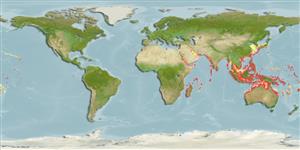Common names from other countries
>
Syngnathiformes (Pipefishes and seahorses) >
Syngnathidae (Pipefishes and seahorses) > Syngnathinae
Etymology: Hippocampus: Greek, ippos = horse + Greek,kampe = curvature (Ref. 45335).
More on author: Bleeker.
Environment: milieu / climate zone / depth range / distribution range
นิเวศวิทยา
เกี่ยวกับทะเล,น้ำเค็ม; กร่อย เกี่ยวกับหินโสโครก; ไม่มีการอพยพย้ายถิ่น; ระดับความลึก 0 - 68 m (Ref. 37816), usually 0 - 8 m (Ref. 90102). Tropical; 39°N - 28°S, 32°E - 154°W (Ref. 57009)
Indo-Pacific: southern Africa, the Red Sea to Hawaii and French Polynesia; north to Japan, south to Australia.
Length at first maturity / ขนาด / น้ำหนัก / Age
Maturity: Lm 14.0 range ? - ? cm
Max length : 30.0 cm TL เพศผู้/กระเทย; (Ref. 1602)
เงี่ยงครีบหลัง (รวม): 0; ก้านครีบอ่อนที่หาง (รวม): 17-18; เงี่ยงครีบก้น 0; ก้านครีบอ่อนที่ก้น: 4.
Inhabit seagrass and marine algae areas of estuaries and seaward reefs; also on steep mud slopes. Found in open water and attached to drifting Sargassum up to 20 km from shore. Adults in pairs (Ref. 48635). Benthic to pelagic (Ref. 58302). Feeds on zooplankton (Ref. 85309). Ovoviviparous (Ref. 205). The males carry the eggs in a brood pouch which is found under the tail (Ref. 205). Not shown to be monogamous in the laboratory (Ref. 30915). Very popular aquarium fish. Highly valued species in traditional Chinese medicine (Ref. 30915). Has been reared in captivity (Ref. 35416).
There are 20 - 1000 larvae in incubating sacks; time of development is 20-28 days. The males carry the eggs in a brood pouch which is found under the tail (Ref. 205).
Lourie, S.A., R.A. Pollom and S.J. Foster, 2016. A global revision of the seahorses Hippocampus Rafinesque 1810 (Actinopterygii: Syngnathiformes): taxonomy and biogeography with recommendations for further research. Zootaxa 4146(1):1-66. (Ref. 115213)
IUCN Red List Status (Ref. 130435)
Threat to humans
Harmless
Human uses
การประมง: เน้นการพาณิชย์; การเพาะเลี้ยงสัตว์น้ำ: การค้า; สถานที่แสดงสัตว์และพืชน้ำ: การค้า
ข้อมูลเพิ่มเติม
อ้างอิงการเพาะเลี้ยงสัตว์น้ำประวัติการเพาะเลี้ยงสัตว์น้ำสายพันธุ์พันธุศาสตร์ElectrophoresesอัตราพันธุกรรมโรคการแปรรูปMass conversion
เครื่องมือ
Special reports
Download XML
แหล่งที่มาจากอินเตอร์เน็ต
Estimates based on models
Preferred temperature (Ref.
115969): 21.3 - 29, mean 27.8 (based on 1008 cells).
Phylogenetic diversity index (Ref.
82804): PD
50 = 0.5000 [Uniqueness, from 0.5 = low to 2.0 = high].
Bayesian length-weight: a=0.00447 (0.00177 - 0.01127), b=3.00 (2.78 - 3.22), in cm Total Length, based on LWR estimates for this (Sub)family-body shape (Ref.
93245).
ระดับชั้นอาหาร (Ref.
69278): 3.6 ±0.5 se; based on size and trophs of closest relatives
ความสามารถในการกลับคืนสู่ปกติ (Ref.
120179): ขนาดกลาง, เวลาต่ำสุดที่จะทำให้ประชากรเพิ่มขึ้นเป็น 2 เท่าใช้เวลา 1.4 - 4.4 ปี (tm=0.6; Fec=20-1000).
Fishing Vulnerability (Ref.
59153): Low vulnerability (15 of 100).
